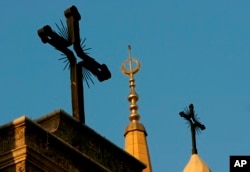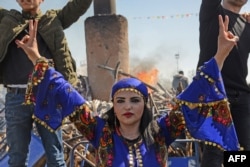As the world marks the 100th anniversary of the end of World War I in 1918, some in the Middle East mourn the fate of nations and peoples who came out losers in the ultimate dissection of the region and the division of the Ottoman Empire.
Armenians mourn their dead during a World War I genocide in which close to a million-and-a-half people were killed. Other peoples who suffered from that war, including Greeks, Assyrians, and Kurds, recall its memory with bitterness.
As the war ended, the Ottoman Empire was divided, leaving communities shattered and broken by ethnic cleansing.
University of Oklahoma Middle East program director Joshua Landis says the Ottoman Empire had allowed many ethnic communities to govern themselves.
"The Ottoman Empire was a Sunni dynastic empire, and it was a multi-religious, multi-ethnic empire," he said. "The various religious and ethnic communities were not equal, but there was a stability and they got along within a framework of Ottoman authority. Once that was destroyed and the French and British imposed national identities and chopped the place up to nation states, many of these nation states included peoples who did not want to live together, and this has led to the recent civil wars."
Minorities like Armenians and Kurds, who were not awarded nation states, paid a heavy price, as Haigazian University President Paul Haidostian tells VOA.
"World War I really changed the demographic picture so quickly. Twenty years after World War I, if you looked at the demography of many of the regions of Asia Minor and the Middle East and so on, they had been impacted, moved, deported and changed in dramatic ways, and there was no protection and there was no logic to what happened, except for the consequences of alliances, of wars, and so on," he said.
But some minorities like Lebanon's Maronite Christians or Syria's Alawites, gained prominence in the period after World War I during the destruction of the old world order, says Landis.
"Both the French and the British pursued a minority policy, and in order to help them rule during the inter-war period, they gave a leg up to minorities across the Middle East," he said. "In Lebanon it was the Maronites, in Syria it was the Alawites, in Iraq it was the Sunni minority, 20 percent, In Israel-Palestine, it was the Jews, who were only 14 percent of the population at World War I."
Haidostian says despite the war's aftermath, Armenians, Kurds, Jews and other minorities rebuilt their communities and struggled once again to flourish.
"So many nations, despite the major losses of land, homes, human lives, in the hundreds of thousands, in the case of the Armenians a million-and-a-half, the story of resilience is really very particular. No matter what some nations may do, minorities, ethnic or religious groups find a way of surviving," he said.
A key lesson of World War I, concludes Paul Haidostian, "is the intersection of the interests of the major powers, the mightier powers, versus those of the smaller powers," which he argues "ultimately pay the price."






